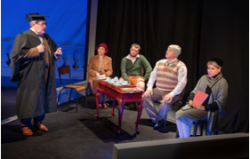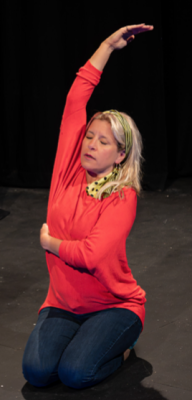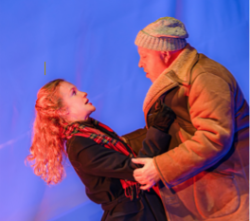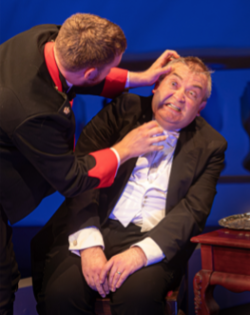 ALAN Ayckbourn has written 81 plays, and now his 2017 work, A Brief History of Women, has opened at Yeovil’s Swan Theatre, making a dozen of his works to be performed at the intimate space. And as always, it is attracting packed audiences for this first view of the play in the region.
ALAN Ayckbourn has written 81 plays, and now his 2017 work, A Brief History of Women, has opened at Yeovil’s Swan Theatre, making a dozen of his works to be performed at the intimate space. And as always, it is attracting packed audiences for this first view of the play in the region.
The director is Liz Stallard, incredibly making her directorial debut with this complicated and nuanced play set in the same house at four periods over the course of 60 years. As with so many of Ayckbourn’s plays, both the set and the characters’ relationships are complex. The director rightly thanks a talented and inventive 20-strong production team.
The linking element is a man called Tony Spates and the four-act play is bookended by Lady Caroline Kirkbridge, in 1925 and in 1985. Kirkbridge Manor is hosting an engagement party in 1925. The ghastly, bullying and bigoted Lord Kirkbridge is bending fiance Capt ffluke’s ear while his third wife is trying to calm her daughter, frustrated by her intended’s absence from the ballroom.
 Twenty years on and the setting is Kirkbridge Prep School. The war is over and the teachers are awaiting the Guy Fawkes celebration. Another two decades and it’s Kirkbridge Arts Centre, where the annual pantomime is in rehearsal. Finally, the building has been taken over as a country house hotel in 1985. Two old friends meet.
Twenty years on and the setting is Kirkbridge Prep School. The war is over and the teachers are awaiting the Guy Fawkes celebration. Another two decades and it’s Kirkbridge Arts Centre, where the annual pantomime is in rehearsal. Finally, the building has been taken over as a country house hotel in 1985. Two old friends meet.
 The six actors – Roger Mumford as farmer’s boy Tony turned school teacher turned arts centre manager turned retired hotel manager, Sarah Nias as Lady Caroline, Swiss teacher Eva and overbearingly theatrical Pat, Samantha Elgar as patronising Mrs ffluke, conniving Phoebe Long, put-upon Gillian Dunbar and hotel receptionist Ruby, Katie Griffiths as fiancee Lady Cynthia, neurotic Miss Brock, irascible Jenny Tyler and grand-daughter Tilly, David Hallett as Lord Kirkbridge, headmaster Wynnie, damely Dennis Dunbar and porter Gordon, and Bradley Napper as Fergus ffluke, sporty teacher Desmond, ban-the-bomber Rory and great grandson Gordon – create unforgettable characters as the story progresses in typical Ayckbournian ways. The script is clever, funny, poignant – and supremely well observed.
The six actors – Roger Mumford as farmer’s boy Tony turned school teacher turned arts centre manager turned retired hotel manager, Sarah Nias as Lady Caroline, Swiss teacher Eva and overbearingly theatrical Pat, Samantha Elgar as patronising Mrs ffluke, conniving Phoebe Long, put-upon Gillian Dunbar and hotel receptionist Ruby, Katie Griffiths as fiancee Lady Cynthia, neurotic Miss Brock, irascible Jenny Tyler and grand-daughter Tilly, David Hallett as Lord Kirkbridge, headmaster Wynnie, damely Dennis Dunbar and porter Gordon, and Bradley Napper as Fergus ffluke, sporty teacher Desmond, ban-the-bomber Rory and great grandson Gordon – create unforgettable characters as the story progresses in typical Ayckbournian ways. The script is clever, funny, poignant – and supremely well observed.
 The writer apparently sees himself as Tony …. an observer of life to whom things happen. I think the title is misleading, though the women certainly have central roles in all four acts. I would also question the 1965 section, in which Rory’s language is much more like that of a 21st century self-centred prig than one 60 years ago.
The writer apparently sees himself as Tony …. an observer of life to whom things happen. I think the title is misleading, though the women certainly have central roles in all four acts. I would also question the 1965 section, in which Rory’s language is much more like that of a 21st century self-centred prig than one 60 years ago.
Well done to Liz Stallard and her exceptional cast, and to the set, sound and lighting designers for creating another mesmerising evening at the Swan. The show continues to Saturday.
GP-W